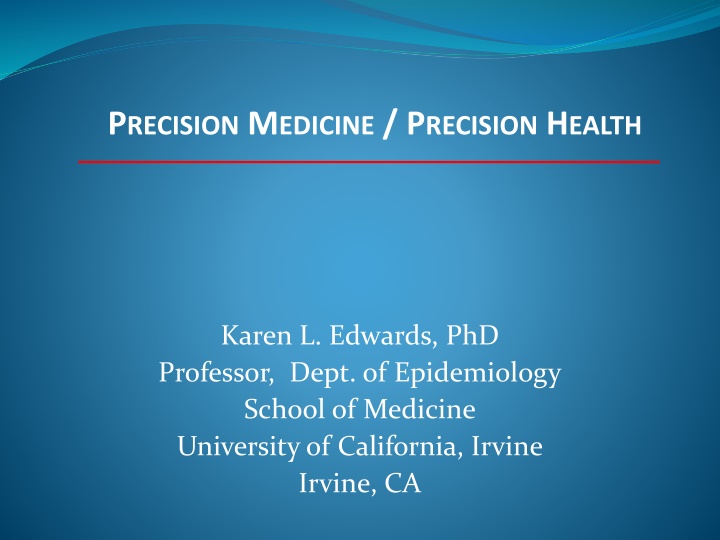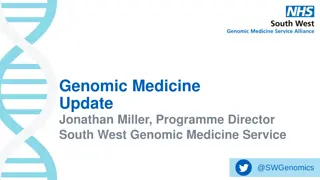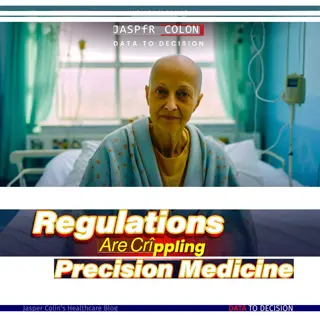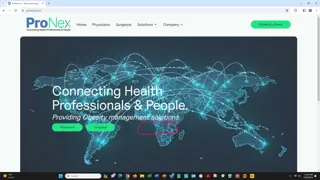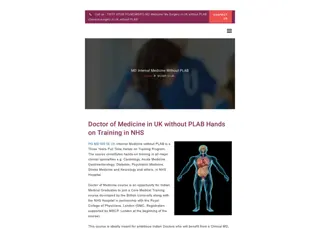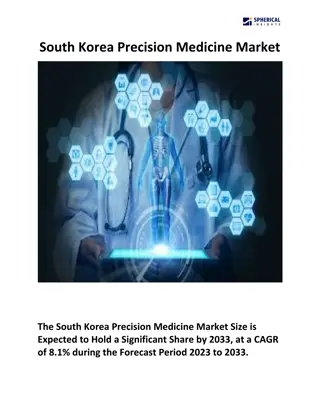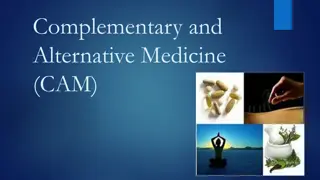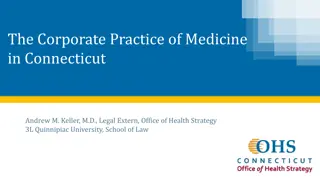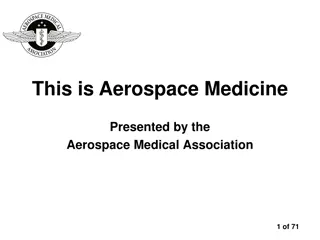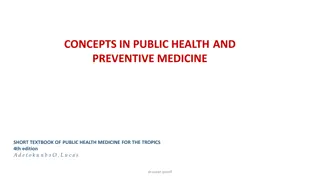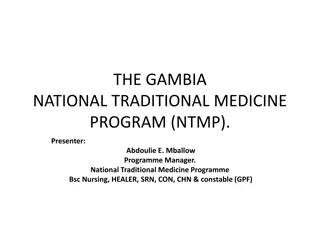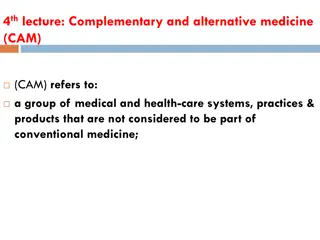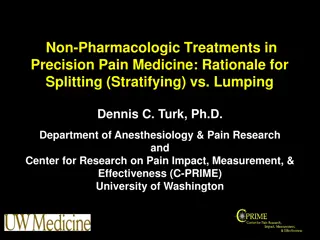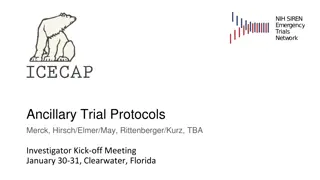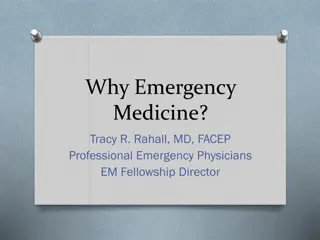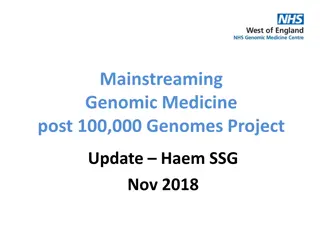PRECISION MEDICINE / PRECISION HEALTH
Precision medicine and genomic medicine are transforming healthcare by using individual genetic information for tailored diagnoses and treatments. National initiatives like the Precision Medicine Initiative and Cancer Moonshot Initiative aim to revolutionize patient care. Pharmacogenomics plays a key role in understanding how genes influence drug responses, paving the way for personalized medication selection. Explore the potential of precision medicine in providing accurate health guidance and improving medical outcomes.
Download Presentation

Please find below an Image/Link to download the presentation.
The content on the website is provided AS IS for your information and personal use only. It may not be sold, licensed, or shared on other websites without obtaining consent from the author.If you encounter any issues during the download, it is possible that the publisher has removed the file from their server.
You are allowed to download the files provided on this website for personal or commercial use, subject to the condition that they are used lawfully. All files are the property of their respective owners.
The content on the website is provided AS IS for your information and personal use only. It may not be sold, licensed, or shared on other websites without obtaining consent from the author.
E N D
Presentation Transcript
PRECISION MEDICINE / PRECISION HEALTH Karen L. Edwards, PhD Professor, Dept. of Epidemiology School of Medicine University of California, Irvine Irvine, CA
Outline Two National Initiatives Precision Medicine Initiative Cancer Moonshot Initiative
2011: National Academies of Sciences a "new taxonomy" that defines disease based on underlying molecular and environmental causes, rather than on physical signs and symptoms http://dels.nas.edu/Report/Toward-Precision-Medicine-Building-Knowledge/13284 5
Credit: www.bayerpharma.com/en/research-and-development/research-focus/oncology/personalized-medicine/index.php
Pharmacogenomics Pharmacogenomics (sometimes called pharmacogenetics) is a field of research focused on understanding how genes affect individual responses to medications. The long-term goal of pharmacogenomics is to help doctors select the drugs and dosages best suited for each person. NIGMS Pharmacogenomics Fact Sheet (https://www.nigms.nih.gov/education/pages/factsheet -pharmacogenomics.aspx) https://precisionmedicine.duke.edu/researchers/precision-medicine-programs/pharmacogenomics 9
Genomic Medicine Genomic Medicine: An emerging medical discipline that involves using genomic information about an individual as part of their clinical care (e.g., for diagnostic or therapeutic decision-making) and the other implications of that clinical use. NHGRI Definition (https://www.genome.gov/27552451/what-is-genomic- medicine/) 10
Precision Medicine Goal of the national Precision Medicine Initiative (PMI) is to provide precise health advice, diagnoses, and treatments for each individual in the population Approach: identify subsets of (homogeneous) patients most likely to benefit from a particular treatment or intervention Molecular profiling to create diagnostic, prognostic and therapeutic strategies tailored to each patient Individualized or Precision Prevention is in the future Will require understanding Gene -Environment interactions Role of Epigenetics Approaches to change behavior National Research Council (US) Committee on A Framework for Developing a New Taxonomy of Disease. Toward Precision Medicine: Building a Knowledge Network for Biomedical Research and a New Taxonomy of Disease. Washington (DC): National Academies Press (US); 2011. Available from: http://www.ncbi.nlm.nih.gov/books/NBK91503/
Precision Medicine Cohort Program Goal is to enroll 1 million people Health Systems Volunteers Diverse sample that represents the US population Age, gender, race, ethnicity Without regard to disease or health status Participation will require Provision of a biological sample for genetic analysis Clinical examination Access to medical records and health information Regular updates of information and longitudinal participation Willingness to enroll in other studies Collection of data via other mechanisms and new technology Return of Results and Access to data by Participants
PMI Cohort Program announces new name
EHRs Genomics Data Science Technologies Patient Partnerships
Program Components Mayo Clinic Biobank Rochester, MN Community Health Community Health Center, Inc. Center, Inc. Middletown, CT Title: Illinois Precision Medicine Consortium Chicago, IL Hudson River Hudson River Health Care Health Care Peekskill, NY Columbia/Cornell /Harlem Hospital Precision Medicine Initiative HPO New York, NY Scripps and Scripps and Vibrent Participant Technologies/ Participant Technologies/ Direct Volunteer Direct Volunteer Opps La Jolla, CA Vibrent University of Arizona - Banner Health Precision Medicine Initiative Cohort Enrollment Center Tucson, Arizona Cherokee Health Cherokee Health Systems Systems Knoxville, TN Precision Approach to healthCARE enrollment Site (PA CARES) Pittsbugh, PA Opps San San Ysidro Ysidro Health Center Center San Ysidro, CA Health Eau Claire Cooperative Eau Claire Cooperative Health Center Health Center Columbia, SC Jackson Jackson- -Hinds Comprehensive Comprehensive Health Center Health Center Jackson, MS Hinds Vanderbilt/Broad/Verily Data Vanderbilt/Broad/Verily Data and Research Support Core and Research Support Core Nashville, TN Biobank Data and Research Support Center Federally Qualified Health Centers Regional Medical Centers Recruitment at VA Hospitals Participant Technology Center Direct volunteer recruitment nationwide
Precision Medicine Genomics is an integral component Genetic Epidemiology will play a central role
Annotation Annotation is the process of marking genes or other biological features in a DNA sequence In genetic epi it is used to identify genes, predict function of genes and their variants Study design focus assessment on genes / variants that are likely functional Interpretation what is the function of the gene / variant that we have identified Continually updated and changing
Bioinformatics Primary goal is to increase understanding of biological processes With growing amount of (genomic) data, it is not practical to analyze manually Develops and applies techniques to manage and analyze large volumes of data Create and promote databases, algorithms, computational and statistical techniques and theory related to management and analysis of biologic (genomic) data End users of the data Some overlaps with genetic epidemiology
Precision Medicine: What is needed (a genetic epidemiologist s perspective) Ability to stratify patients, tumors, population into more homogeneous subgroups Genomic and epigenomic profiling Biomarkers Evidence for Clinical Validity and Utility Large samples 1 million person national PM cohort Big Data linking with EHR and other data sources Will rely on existing studies and data May be a need for new data collection to fill in gaps Engaging research participants Stakeholder input Incorporate input from broad stakeholder groups, including research participants Incorporate environmental and lifestyle factors for Prevention Focus on Gene x Environment interactions Modifiable environmental and lifestyle factors Approaches for behavior change that promote adoption of risk reducing factors
